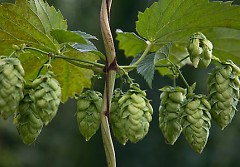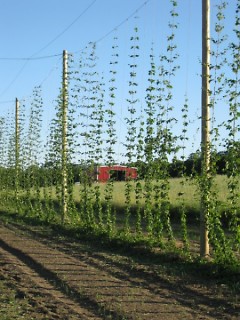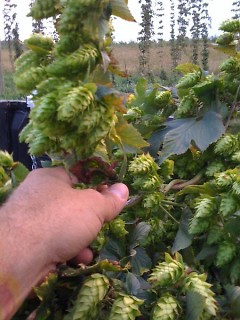
Michigan organic hops /New Mission Organics

Hops farm in Michigan /New Mission Organics

Vine of Michigan organic hops /New Mission Organics

Michigan organic hops /New Mission Organics

Hops farm in Michigan /New Mission Organics

Vine of Michigan organic hops /New Mission Organics
Michigan’s first annual beer month just came to a close and a look around area farms reveals a surge in growth for a key beer ingredient: hops. West Michigan is experiencing a renaissance in hops farming, with breweries putting their full support behind the local hop growing movement. Local hop farming, though small-scale, continues to grow due to the community’s enthusiastic reception of locally and sustainably grown hops.
Most recently, in a collaborative effort, ten West Michigan breweries created Beer City Pale Ale, which used organic Michigan-grown hops. Looking towards the end of summer, Grand Rapids will also be home to Michigan's first certified organic brewery, the Grand Rapids Brewing Company (GRBC). Beer City Pale Ale and GRBC are just two examples of West Michigan’s growing demand for organic and locally-sourced beers, which means more hop farming in the state.
“Using organic hops is an essential part of how we brew beer and do business,” said Samuel Short, general manager of GRBC. “By using Michigan certified organic hops we hope to be an integral part of the Michigan organic movement.”
Michigan hop farming will continue to grow with recent changes for organic beer certification. In the past, beer did not have to use organic hops to be certified organic by the U.S. Department of Agriculture. However, beginning January 2013 that code will change and breweries will be required to use organic hops in order to produce certified organic beer.
“Years ago, hops were exempt from having to be organic because at the time there were simply not enough organic hops being grown,” said Brian Tennis, director of sales and marketing at the Michigan Hop Alliance.
An increase in Michigan breweries set the foundation needed for the increase in organic hops crops. Already, many West Michigan breweries are ahead of the curve when it comes to using organic Michigan-grown hops. As Michigan’s largest organic hops farm, the Michigan Hop Alliance provides hops for Founders Brewing Co.’s Harvest Ale, Jolly Pumpkin’s Fenian’s Irish Stout and New Holland Brewery’s Hopivore Harvest Ale, as well as the previously mentioned Beer City Pale Ale.
In the Civil War era, the Michigan hops industry was larger, but suffered a drastic decline after a hop louse infestation. Today, Michigan hops farmers face challenges like investment and pricing difficulties, especially when faced with the lower prices of hops from large-scale industries in the Pacific Northwest where the majority of hops used in Michigan beer are grown. Because the Michigan hops industry is comparably smaller, it cannot match the lower prices offered for Pacific Northwest hops. Nor can the current hops industry fulfill Michigan’s booming beer industry’s needs, which requires roughly 400 acres of hops to supply production needs. Presently, Michigan growers produce around 100 acres of hops.
“The volume of hops that us larger brewers require to satisfy our demand dictate that we continue to work with larger growers of the Pacific Northwest,” said Mike Stevens, President of Founders Brewing Co. “However, we have been encouraged by the quality improvements that our Michigan growers have been making and will continue to support their efforts.”
Despite the price and availability difficulties that accompany Michigan-grown hops, West Michigan beer makers are highly receptive to supporting local hop growers.
“Right now hops are a niche crop here in Michigan,” said Tennis. “I do however see a bright future in organic hop farming.”
Not only are breweries using local products but homebrewers are also supporting the local organic hops movement.
“Local homebrewers are very interested in using Michigan-grown hops,” said Steve Siciliano, owner of Siciliano’s Market. “Price, for the most part, is not a deterrent.”
With Michigan ranked fifth in the nation as a beer state and increased momentum behind the local organic hops movement, West Michigan beer is hopping up to the plate and ensuring a bright future for all current and future beer enthusiasts.
The Rapidian, a program of the 501(c)3 nonprofit Community Media Center, relies on the community’s support to help cover the cost of training reporters and publishing content.
We need your help.
If each of our readers and content creators who values this community platform help support its creation and maintenance, The Rapidian can continue to educate and facilitate a conversation around issues for years to come.
Please support The Rapidian and make a contribution today.